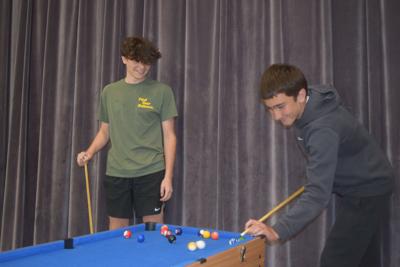While there was uncertainty heading into the school year, Lakes Region students and staff gave positive feedback about a state law prohibiting students from using cell phones and other personal electronics throughout the day.
“Honestly, I really like it,” said Molly O’Connell, an 11th grader at Belmont High School, as she entered the cafeteria for lunch. “I really haven’t used my phone once.”
BHS student Bailey Perkins, also in 11th grade, agreed, saying in the past she would stress about things going on outside school. The new rule removes the temptation of checking social media, texts and other apps.
“It’s been a breath of fresh air,” Perkins said.
Belmont High School has been proactive in allowing for a smooth transition to the “bell-to-bell” ban policy, which means students need to have phones and other communication devices off and out of sight. In the cafeteria there are now games like Jenga and Uno available for students to play at their tables with classmates. At the front of the room is a mini pool table, and a foosball table, which students regularly enjoy.
Two such enthusiasts are first-year students Devlin McPherson and Braydon Lemay, who were going head-to-head in a game of pool during their lunch period on Tuesday. Both said having the games has been a fun way to give them something to do. They believe the policy has been easiest on ninth graders, since Belmont Middle School already had a bell-to-bell policy last year, but felt it could be harder for older students. A positive, McPherson said, is some of those returning students have been joining them in the games.
“I think it is better for freshmen, because we are used to not using phones in school,” McPherson said.
School administrators reported that while there have been some infractions, feedback has been much more positive than expected. Several said it helps that the ban was put into law, instead of being a district decision.
“It helps that it is a rule for everyone, and not just a policy that the school brought forward,” said Laconia High School Interim Principal Mike Boyle. “The feedback from students is that this is actually a very good thing.”
Boyle said one student he spoke with said they are seeing much more engagement in class, and haven’t seen any phones confiscated at all. A student told him there are some frustrations, like the inability to listen to music on the phones, or use personal email, but the benefit is eliminating distractions.
Boyle said Laconia is taking the “restorative approach,” rather than focusing on discipline. If teachers or staff catch a student on their phone, they aren't necessarily in trouble, but teachers would rather help them adjust. Early in the year there was some pushback, but he said “99% of students understand.”
Moultonborough Superintendent Patrick Andrew said there have been “very few problems” in his district.
“The kids have been very cooperative,” Andrew said. “There have been a couple incidents, but no significant disciplinary action.”
School leaders across the Lakes Region commented on how loud cafeterias are once again, in a good way. Students are talking to each other instead of going on TikTok or Instagram, engaging in conversation like never before for many.
Gilford High School Principal Anthony Sperazzo recently met with several students to gather feedback on the change, and said students “overwhelmingly” reported they are interacting more.
“This has been a common theme that staff and students have noticed — the lunchroom has more noise, but a welcome noise,” Sperazzo said. “Some students reported that at the beginning of the school year it was difficult to remember not to use their phone, during transition time in the hallways, but now they're used to it, and it's easy.”
Sperazzo said teachers are reporting students are maintaining focus throughout the whole class, and aren’t worried about checking notifications on social media.
“For Gilford, students could not use cell phones during class time so this has not been a huge shift for us,” Sperazzo said. “The major change has been during transitions and lunches. This is where staff members have seen the greatest growth with students interacting with one another, smiling, laughing, and having more face-to-face conversations.”
Gilford Superintendent Kirk Beitler added they have had great support from parents and students, and haven't received much pushback.
“As controversial as it may have been when the law came into effect, it is a good thing for teaching, learning and social interactions,” Beitler said.
Going into the school year, Belmont High Principal Matt Finch wondered how things would go during lunch and the passing periods, as these were formerly times when students could have their devices out. However, there have only been “a handful” of infractions.
Belmont uses a tiered disciplinary system, where the device is confiscated, the parent or guardian is called, and the student is dismissed, for a first offense. The second offense involves a guardian coming to pick up the device.
Associate Principal Vanessa Sandvil said there is never an intention of a “gotcha” moment, and at the start of the school year, she and Finch spoke with students about the rules.
“It was a chance to set clear expectations,” Sandvil said.
She also said the policy is new to everyone, so adjustments are being made as they go. She stressed electronics certainly have benefits, and in a technologically-laden society, there are needs for them. For example, there are some instances where students are allowed to listen to music with corded headphones, or an avid reader could use a Kindle Paperwhite.
“We are still working on finding compromises in some scenarios,” she said. “In every law or policy there is interpretation.”
Sperazzo said as students grow in Gilford, the district must grow with them. He met with Scott Currier, a math teacher at GHS, who said they need to continue adapting instruction to include technology in meaningful ways.
Currier noted technology tools used for education, as well as test preparation strategies for online learning, are tools with which students need to be familiar. In what he described as an “increasingly tech savvy world,” teachers will need to educate students on how to use the devices properly.
Edith Takantjas, a French teacher at Belmont High, said one “glitch” she has witnessed is students trying to sign up for early college classes through Lakes Region Community College, as a cellphone is needed to do so. She suggested there are exceptions to the rule.
While she said it hasn’t necessarily affected engagement in the classroom, as students were not allowed to have phones out during instruction previously, she said it's nice to not have to tell them to put their devices away at the start of class.
Administrators and staff across the board have said it's been fun to see students interact in a whole new way.
“They are making conversations, rather than avoiding them,” Finch said.
“It has made a profoundly positive impact on the school.”


















(0) comments
Welcome to the discussion.
Log In
Keep it Clean. Please avoid obscene, vulgar, lewd, racist or sexually-oriented language.
PLEASE TURN OFF YOUR CAPS LOCK.
Don't Threaten. Threats of harming another person will not be tolerated.
Be Truthful. Don't knowingly lie about anyone or anything.
Be Nice. No racism, sexism or any sort of -ism that is degrading to another person.
Be Proactive. Use the 'Report' link on each comment to let us know of abusive posts.
Share with Us. We'd love to hear eyewitness accounts, the history behind an article.